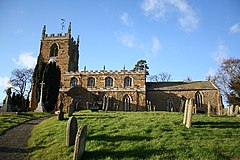Tealby
| Tealby | |
|---|---|
 All Saints' church, Tealby |
|
| Tealby shown within Lincolnshire | |
| Population | 593 (20`11) |
| OS grid reference | TF155907 |
| • London | 130 mi (210 km) S |
| Civil parish |
|
| District | |
| Shire county | |
| Region | |
| Country | England |
| Sovereign state | United Kingdom |
| Post town | Market Rasen |
| Postcode district | LN8 |
| Dialling code | 01673 |
| Police | Lincolnshire |
| Fire | Lincolnshire |
| Ambulance | East Midlands |
| EU Parliament | East Midlands |
| UK Parliament | |
Tealby is a village and civil parish in the West Lindsey district of Lincolnshire, England, situated on the edge of the Lincolnshire Wolds and 3 miles (5 km) north-east from Market Rasen. The population of the civil parish at the 2011 census was 593.
Tealby is noted for the Tennyson d'Eyncourt family which donated the village hall and school. In the 1980s the school was used for filming the programme Nanny.
In the early 2000s the village was granted permission for a shop to be built, now run by volunteers. The village post office was threatened with closure, however it remains open at certain times of the week. Tealby church, built using local orange-iron stone, is dedicated to All Saints and dates back to the 12th century; it holds memorials to the Tennyson d'Eyncourt family. Tealby residents included Bernie Taupin, who lived on Beck Hill.
The Kings Head, one of two public houses in the village, is one of the oldest in the country and retains a thatched roof.
Tealby has a Bowls Club, and a Lawn Tennis Club whose tennis courts are a facility for the wider district, the club promoting a Young Leaders Tennis Course and competitions. The village hall, run by a committee, is used for parties, social events, playgroups, school events and meetings.
Tealby's Bayons Manor was once owned by Charles Tennyson, later Tennyson d'Eyncourt, the uncle of Alfred, Lord Tennyson. The estate was purchased in 1944 by a local farmer, primarily for the farmland as the house was already derelict and becoming dangerous. Because of its dangerous condition a subsequent owner had it demolished in 1964. Bayons Manor was a rare example of a Victorian stately home in the style of a moated castle.
...
Wikipedia

